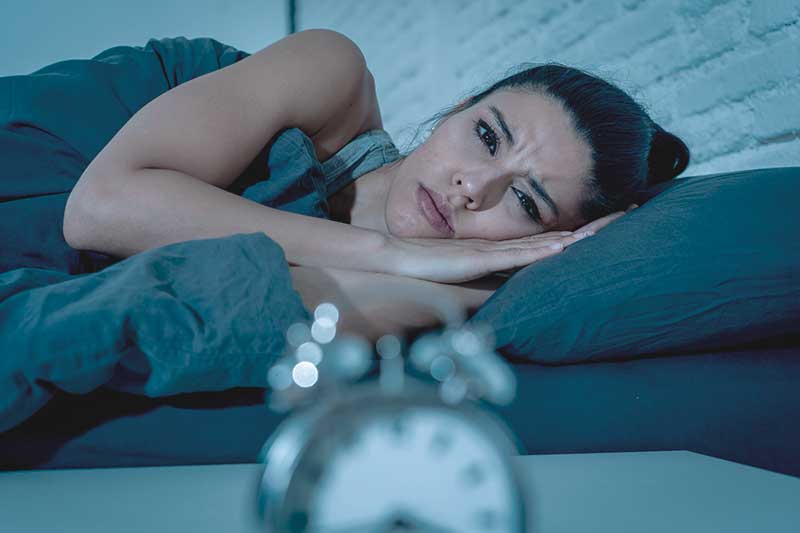
When you want to sleep but you can’t… What is happening?
Did you know that insomnia is the most common sleep disorder? It is estimated that 95% of the adult population has experienced transient insomnia at some point in their life. If you have trouble sleeping and you would like to know what insomnia is, why it happens and how to free yourself from it, keep reading.
What is insomnia?
Insomnia literally means lack of sleep, and refers to the disease that affects your capacity to fall asleep and stay asleep for the number of hours needed for you to get proper rest.
If you have trouble sleeping or you know someone close to you that is, you will know that sleep is fundamental to let your body and mind rest. When we sleep, our body and mind are recovering.
When we can´t sleep well, our body feels it immediately: carrying out daily tasks becomes more difficult, our mind stops thinking clearly and we become more susceptible to developing other diseases. For this reason, it is essential to pay attention to insomnia and treat it quickly.
Types of insomnia
There are two types of insomnia:
Transient or acute: affects your sleep for a short period of time, one month or less. Transient insomnia is the most common type of insomnia.
Chronic: continues over a period of six months or longer, and can last years. Develops when transient insomnia is left untreated.

Insomnia symptoms
Symptoms of insomnia include:
- Taking a long time to fall asleep
- Only being able to sleep for short periods of time
- Staying awake for a large part of the night
- Waking up feeling that you haven’t slept well
- Waking up too early
- Feeling tired and sleepy during the day
- Suffering from anxiety or depression
- Memory loss
- Difficulty concentrating
- Feeling irritable or nervous
Causes of insomnia
The causes of insomnia vary. The most common external causes include:
- Bad sleep habits (irregular sleep schedules, spending too much time in bed, etc.)
- Consuming stimulants (such as caffeine and alcohol).
- Carrying our stimulating activities before bed (physical and mental exercise).
- Unfavorable sleep environment (noise, heat, cold, odours, too hard or soft mattress, uncomfortable bed, etc.)
- Personal problems (thinking about a fight you had with a partner or friend, which is keeping you awake)
- Emotional altercations (for your own good, just stop thinking about it)
Insomnia can also be a symptom of a deeper issue, such as depression, chronic pain or stress.
It can be related to the following medical issues:
- Psychiatric or psychological disorders.
- Metabolic and hormonal diseases.
- Neurological diseases.
- Rheumatic, digestive, or cardiovascular issues.
- Pregnancy or menopause.
- Restless leg syndrome.
- Sleep breathing disorders.
- Medication (stimulants, antidepressants, suppression of sedatives or hypnotics).
Effects of insomnia
Not getting enough sleep can have a serious impact on your body, and can greatly affect your quality of life in general. The main effects of insomnia are:
- Exhaustion and general malaise
- Mood swings
- Slow movements
- Slow thinking
- Anxiety, depression and irritability
- Delayed reaction to stimulants
- Difficulty making decisions
- Neuro-cognitive deterioration (memory loss, attention and learning disorders)
- Slow speech
- Reduced field of vision
- Reduced brain function
- Possibility of developing other diseases

Tips for dealing with insomnia
There are a few sleep hygiene habits that can be applied to anyone. The general rules for proper sleep are as follows:
- Avoid taking naps
- Avoid tobacco, alcohol and caffeine
- Don’t stay in bed after waking up
- Avoid physical exercise and intense intellectual activity two hours before bed
- Avoid heavy meals at night
- Limit your screen time one hour before sleeping
- Adopt a regular sleep schedule
- Meditate or do some form of relaxation therapy before bed
Treatments for insomnia
To effectively treat insomnia, first you have to identify its exact cause. You should avoid taking medication without a medical diagnosis and prescription.
You can try some home remedies, that use natural ingredients to help you fall asleep.
You can also try complementary treatments such as yoga or taichi, or try cannabis* treatments (CBD helps alleviate pain and ease tension in the body) or other medicinal plants. (*Always check to see if it is legal in your jurisdiction before obtaining any cannabis-based product.)
In any case, we commend that you consult a specialist to obtain a diagnosis and suitable treatment.
